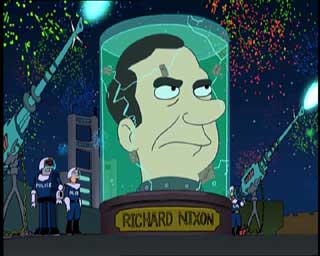Darwin Strikes Back
Dealing another in a quick series of body blows to the Intelligent Design movement, U.S. District Judge John Jones earlier today found that presenting ID to Pennsylvania public school students is unconstitutional. Faboo.
The only apparent difference between the argument made by Paley and the argument for ID, as expressed by defense expert witnesses Behe and Minnich, is that ID’s “official position” does not acknowledge that the designer is God. However, as Dr. Haught testified, anyone familiar with Western religious thought would immediately make the association that the tactically unnamed designer is God, as the description of the designer in Of Pandas and People (hereinafter “Pandas”) is a “master intellect,” strongly suggesting a supernatural deity as opposed to any intelligent actor known to exist in the natural world. (P-11 at 85). Moreover, it is notable that both Professors Behe and Minnich admitted their personal view is that the designer is God and Professor Minnich testified that he understands many leading advocates of ID to believe the designer to be God. (21:90 (Behe); 38:36-38 (Minnich)).
Although proponents of the IDM occasionally suggest that the designer could be a space alien or a time-traveling cell biologist, no serious alternative to God as the designer has been proposed by members of the IDM, including Defendants’ expert witnesses. (20:102-03 (Behe)). In fact, an explicit concession that the intelligent designer works outside the laws of nature and science and a direct reference to religion is Pandas’ rhetorical statement, “what kind of intelligent agent was it [the designer]” and answer: “On its own science cannot answer this question. It must leave it to religion and philosophy.” (P-11 at 7; 9:13-14 (Haught)).
A significant aspect of the IDM is that despite Defendants’ protestations to the contrary, it describes ID as a religious argument. In that vein, the writings of leading ID proponents reveal that the designer postulated by their argument is the God of Christianity. Dr. Barbara Forrest, one of Plaintiffs’ expert witnesses, is the author of the book Creationism’s Trojan Horse. She has thoroughly and exhaustively chronicled the history of ID in her book and other writings for her testimony in this case. Her testimony, and the exhibits which were admitted with it, provide a wealth of statements by ID leaders that reveal ID’s religious, philosophical, and cultural content.
This quote is from pages 25 and 26, which are representative of the whole 139 page ruling. The thrust of this finding is that ID is a religiously-motivated movement, working for religious ends in the public school classroom. Judge Jones, however, provides a mountain of factual, logical and case law evidence to support his ruling. For example:
After a searching review of the record and applicable case law, we find that while ID arguments may be true, a proposition on which the Court takes no position, ID is not science. We find that ID fails on three different levels, any one of which is sufficient to preclude a determination that ID is science. They are: (1) ID violates the centuries-old ground rules of science by invoking and permitting supernatural causation; (2) the argument of irreducible complexity, central to ID, employs the same flawed and illogical contrived dualism that doomed creation science in the 1980's; and (3) ID's negative attacks on evolution have been refuted by the scientific community.
The third point really boils the IDeologues' blood, apparently because they are unfamiliar with the many and varied refutations of all contentions raised by ID on every level. (For an extensive, though far from comprehensive list, see http://www.talkorigins.org/indexcc/list.html)
Religious types are, of course, rolling out the "judicial activism" mantra on this one. This argument - not unlike ID - fails the test of logic, because the "judicial activism" label could be applied no matter what side he ruled for. In this case, because he is preventing action from being taken, he is a judicial activist. On the other hand, if he had allowed ID to be exposed to public school students, that would be judicial activism in the same sense that Roe v Wade allowed women to seek abortions. Therefore, no matter what ruling he made, he was doomed to be branded with the "judicial activist" monkier.
Do youself a favor and read the entire thing - it's actually fun! Oh... One more, just to celebrate:
The breathtaking inanity of the Board’s decision is evident when considered against the factual backdrop which has now been fully revealed through this trial.


<< Home